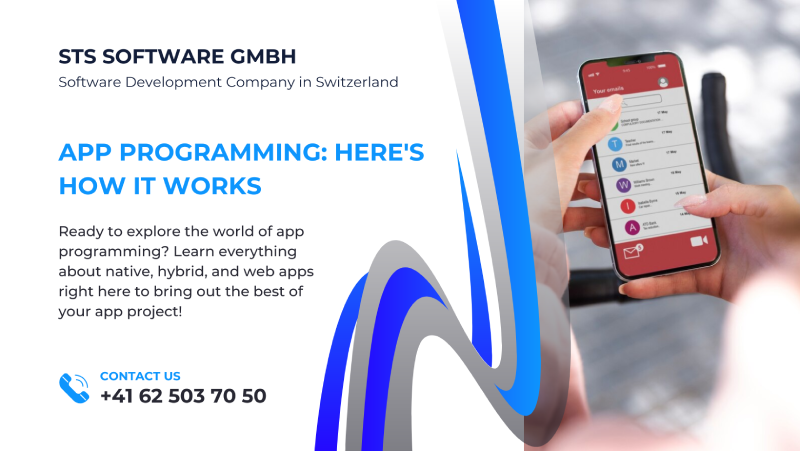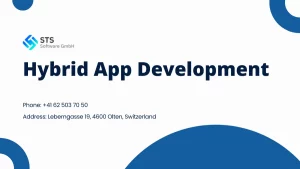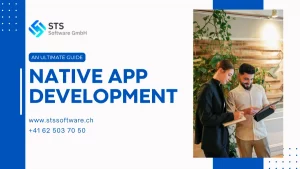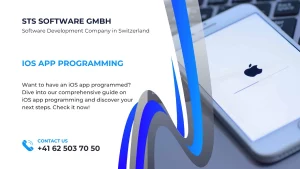App programming takes center stage as mobile app demand explodes. Businesses now face two main approaches to consider:
- Program native apps: Android app programming (with Java) and iOS app programming (with Swift) ensure your apps have outstanding native features and optimized user experience.
- Program hybrid apps and web apps: These apps are more flexible. Programming languages like JavaScript and HTML5 assist businesses in creating hybrid and web apps efficiently.
If you want to learn to program apps and dream to program an app yourself, this article will help by exploring the ins and outs of app programming, including different types of apps, the pros and cons of each, and which technologies work best for them.
Don’t know how to program an app? No worries! You can have an app programmed by hiring our experienced app developers. Our expertise and experience will bring your app idea to life!
App Programming: An Overview

An application, or app, is a software program built for mobile devices like tablets and smartphones. Unlike traditional computer computer software, apps are smaller, optimized for touchscreens, and focused on specific tasks. These features make them more efficient for on-the-go use.
Functionality of Apps
Apps extend mobile device functionality with new features and functionalities. For example, gaming apps offer entertainment with interactive features, while productivity apps aim to assist in task management. Social media apps are popular these days, too, as they facilitate communication by connecting users worldwide.
App Programming
App programming is about developing software for mobile devices. It offers broader hardware access than traditional programs.
Apps can use hardware components like GPS for location-based services, cameras for photo and video capture, and accelerometers for motion detection. These hardware integrations allow apps to offer rich, interactive experiences.
Programming libraries help bridge knowledge gaps for developers by providing collections of pre-built code. They also come with advanced functionalities such as accessing sensors and handling network communication. App developers can then deal well with complex features, optimize development time, and ensure robust app performance.
Types of App Programming
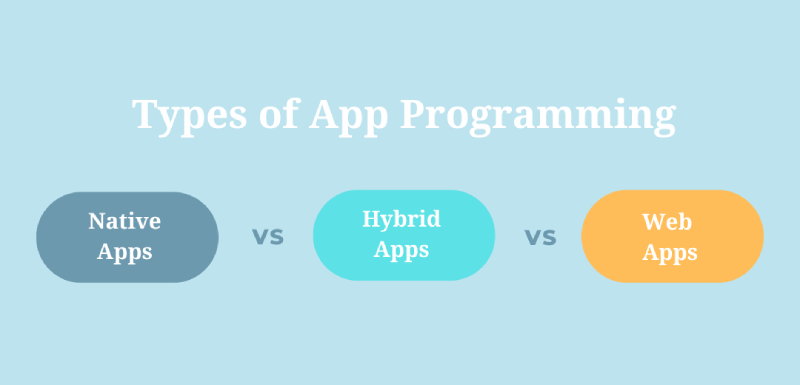
There are several types of app programming, such as:
- Native app programming involves using languages like Java and Kotlin to program an Android app or using Objective-C and Swift to program a mobile app for iOS devices. This approach ensures optimized performance and full integration with native software and hardware. However, it comes with a higher development cost and longer development time.
- Hybrid app programming refers to using web technologies to build an app that can run like native apps. This way, the app can have cross-platform compatibility, lower costs, and faster development. Yet, its performance is not as robust as native apps.
- Web app programming means using web app programming technologies to build apps. Then, users can access them through web browsers. The apps require no installation and are independent. However, they have limited access to specific device features.
App builders are tools that allow users to program an app with little to no programming knowledge. Some offer app development options for free. So, even non-developers can learn to program an app, but its customization, control, and performance will be limited.
Learn more: Native App vs. Hybrid App vs Web App: Choosing the Right Path
App Programming Languages and Tools
Programming languages and tools are the foundation for building apps. The most popular programming languages for apps include:
- Swift for iOS
- Java and Kotlin for Android
- JavaScript for hybrid and web apps
Java and JavaScript are the most widely used solutions, according to research by Statista. In the same survey, more than 44% of respondents program an app with Python.
Development tools, like Integrated Development Environments (IDEs), are beneficial for app programming. Android Studio for Android apps and Xcode for iOS apps offer features for code editing and debugging. These tools simplify the development process and ensure high-quality outcomes.
Native App Programming: iOS and Android
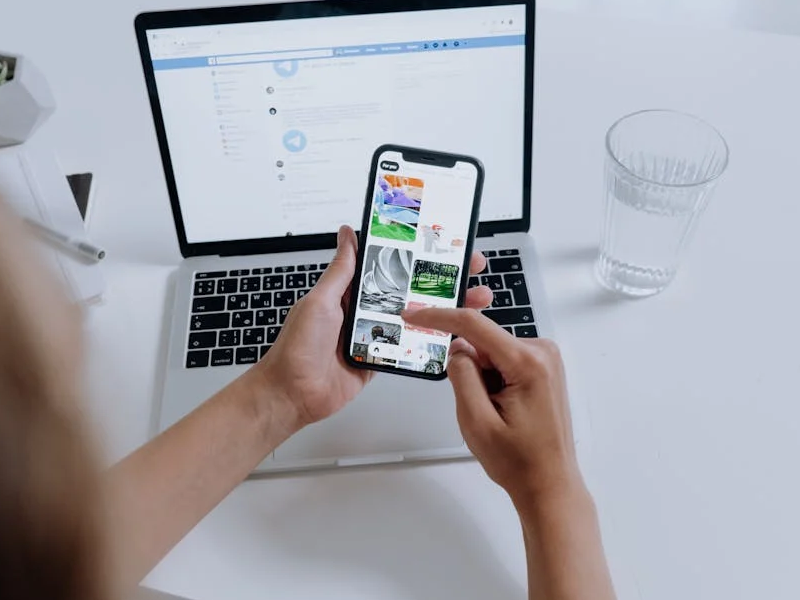
Native apps are developed for a particular platform, such as iOS for iPhones/iPads and Android for various devices. Due to its native nature, the apps have the best performance, user experience, and access to native features, like GPS, accelerometer, camera, gyroscope, and microphone.
Programming an app this way requires knowledge of platform-specific programming languages, such as Swift for iOS and Java/Kotlin for Android. An app programmer must be proficient in these skills to program an app for iOS and Android correctly.
Native Android App Programming: Android Studio
Developers create apps for mobile devices like smartphones and tablets. Then, they will publish their work on the Google Play Store. These devices, manufactured by Samsung, HTC, Xiaomi, and Huawei, dominate markets in the DACH region. They take up 47.54% of the mobile operating market share in Switzerland. This figure for Germany is 65.81%.
The ultimate Android app development tool is Android Studio. This free, open-source program by Google runs on Windows, macOS, and Linux. They provide so many tools that you can program an Android app yourself without any extensive expertise.
Visual Studio is another excellent choice. If you program an Android app using Visual Studio, you can easily integrate it with Microsoft services and the Azure cloud platform.
Developers can also learn to program an Android app using Android SDK. This free tool can be downloaded from Android’s website. Coming with many libraries, developers can easily use it to program an Android app with Java or other languages.
Ready to create your own Android app? Learn it right now and unlock the full potential of Android app development!
Let check our article: Android App Programming: Here’s how it works
Native iOS App Programming: Xcode
Developers program an Apple app specifically for Apple devices, like iPads and iPhones. Those advanced devices are famous for their seamless hardware and software integration, resulting in top-notch performance and user experience. Due to the outstanding benefit, as of March 2024, iOS is the most common operating system for smartphone users in Switzerland, with more than 47% of respondents using it.
Swift was introduced in 2014 by Apple as the primary programming language for iOS app development. This intuitive and powerful language can work for all developers looking to program an iPad app.
If you are planning to program a Swift app, consider using Xcode, Apple’s integrated development environment (IDE). This tool allows developers to take full advantage of the hardware and software features of iOS, helping developers program an iPhone app easily.
Moreover, Xcode supports Swift and Objective-C. Developers can also program an iOS app using Xcode’s interface builder for the graphics and test its functionality with the testing features.
Want to start and succeed with your iOS development project? Learn to program an iOS app today! Xcode is already there to help you thrive in the Apple ecosystem!
Native Windows Phone App Programming
Native Windows Phone app programming once helped developers create apps, especially for Microsoft’s Windows Phone platform. However, Microsoft discontinued development for new features on the platform in 2026. Hence, the user base has shrunk significantly.
Most users moved to other platforms like iOS and Android. Also, developers are unwilling to invest time and resources to program a Windows app for this operating system.
Hybrid App Programming: Hybrid Form of Native App and Web App

Hybrid apps combine elements of both native apps and web apps. More specifically, developers use web technologies to create a single codebase that runs within a native app container. This way, developers can program iOS and Android apps using the unified code.
Benefits
Hybrid apps offer several advantages, such as:
- Faster development: The use of a single codebase for different platforms speeds up the development process.
- Cross-platform compatibility: The hybrid app can work on various platforms, including iOS and Android.
- Easier maintenance: The app programmer can update and fix bugs across all platforms simultaneously.
Limitations
Hybrid apps may not always match the performance of native apps. Moreover, they can’t access all device-specific features. As a result, compared to fully native apps, they have restricted functionalities.
Technologies
Two popular frameworks for hybrid app development are:
- React Native: Created by Facebook, this framework uses JavaScript and React components for hybrid apps, making it a popular choice for developers looking to program an app with JavaScript.
- Flutter: Flutter, developed by Google, uses the Dart programming language. Developers can program a Flutter app with ease while ensuring it can cater to multiple platforms.
Web App Programming

Web apps combine websites and apps. They are built using web development technologies like CSS and JavaScript, but they can function like an app. Users can access them through any web browser on a mobile device, making them a flexible and versatile solution.
Benefits
Unlike native apps, web apps don’t require individual installation on each device. Thus, users don’t have to go through the process of downloading and installing, leading to higher user engagement.
Another benefit of programming web apps is universal access. Developers program an app and then make it accessible to all users with any device.
Limitations
Web apps don’t have many device-specific features. However, they require an internet connection to function correctly. Hence, their usability in offline scenarios.
Moreover, the user experience may be less integrated compared to native apps. The overall satisfaction will be reduced as a result.
Technologies
To have a web app programmed, developers need to use the right tools. Java and Python are the most common choices for programming web applications. Developers can program a Java app using frameworks like Spring and Java Server Pages (JSP). And to program a Python app, they can work with Flask and Django. All these solutions ensure robust and scalable web apps.
Turn your idea into reality. Get started with Web App Development today!
Progressive Web Apps (PWAs)
PWAs have all the advantages of traditional web apps and native mobile apps, such as:
- Native-like functionality: PWAs can be installed on your home screen, work offline, and send push notifications.
- User experience: PWAs provide a faster user experience compared to traditional web apps. They can load quickly, even on slow networks. Plus, the design is responsive, as the app can adjust automatically to fit different screen sizes.
- No app store approval needed: Unlike native apps, PWAs don’t require approval from app stores like Apple or Google, hence speeding up the deployment process. Developers can also push updates to users quickly.
Easy App Programming – The App Builder
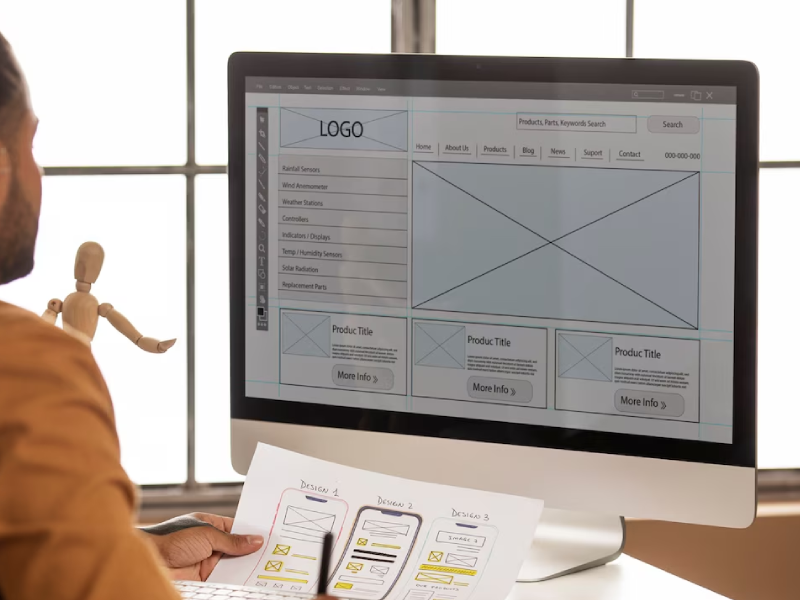
The app builder is a software platform that helps program your own app for free. Targeting beginners with limited coding knowledge, the builder has reusable templates with drag-and-drop tools, making it easier to create user-friendly interfaces.
App builders provide users with pre-built components and customized layouts. This approach simplifies the development process, allowing users to quickly create functional apps without writing code.
Even so, app builders still have disadvantages. For example, the pre-made elements may not offer the level of customization that your complicated projects need.
Furthermore, apps created with app builders often lack some advanced functionalities, resulting in less sophisticated apps.
App Programming: Choosing the Right Approach
You should start by selecting the right development approach to program a mobile app. Here is what to consider for your project:
Complexity Of Your App
If your app requires complex features and deep integration with device functionalities, native app programming may be the best option. It allows for the highest performance and access to all device-specific features, offering an efficient user experience.
Target Audience
If your target audience only uses one type of device (iOS or Android), native development can guarantee the highest user satisfaction. Meanwhile, hybrid or web app programming will be more suitable if you need to reach a broad audience across different platforms.
Development Resources and Budget
Hybrid and web apps can be faster and cheaper to develop. You can also use an app builder to cut down the cost of having an app programmed and optimize development time.
Desired User Experience
Native app development is known for its highly integrated user experience. Native apps offer the best performance, user experience, and access to device features.
Additional Option
PWAs combine the best of both worlds. They provide a more responsive user experience than traditional web apps and can work offline. Plus, users can install them on the home screen without requiring app store approval.
Program your own app with STS Software GmbH
How difficult is it to program an app? What is the cost of programming an app? Or do you want to program an app yourself? Whatever your concern is, STS Software GmbH can help enhance the value and success of your project. By partnering with us, you can earn all the following benefits:
- STS Software GmbH is a leading app development company in Switzerland.
- We offer competitive pricing to ensure an affordable solution for your project without compromising quality.
- We have expertise in many industries (healthcare, banking, retail, etc), so your app can meet industry standards and specific needs.
- Our team of more than 50 skilled app programmers works diligently and professionally to program an app tailored to your needs.
- We use cutting-edge technologies such as AI, ML, and cloud-based solutions that bring innovation to every project.
- With NDA agreements and ISO certifications, we can program an Android app or program an iOS app with the highest security level.
Ready to develop your app? Explore our mobile app development services!
Conclusion
There are multiple types of app programming. Native app development offers the best performance and access to device features, while hybrid and web apps provide cross-platform compatibility and faster development times.
Many ongoing advancements in app development tools and frameworks simplify how to program an app. Whether you are learning app programming or want to hire professionals for your project, explore these developments to ensure your success!
